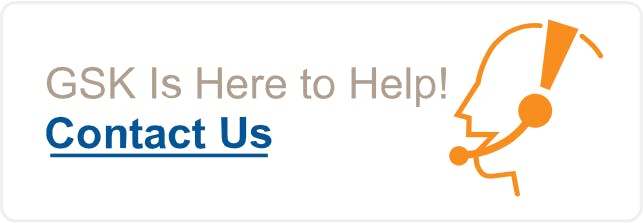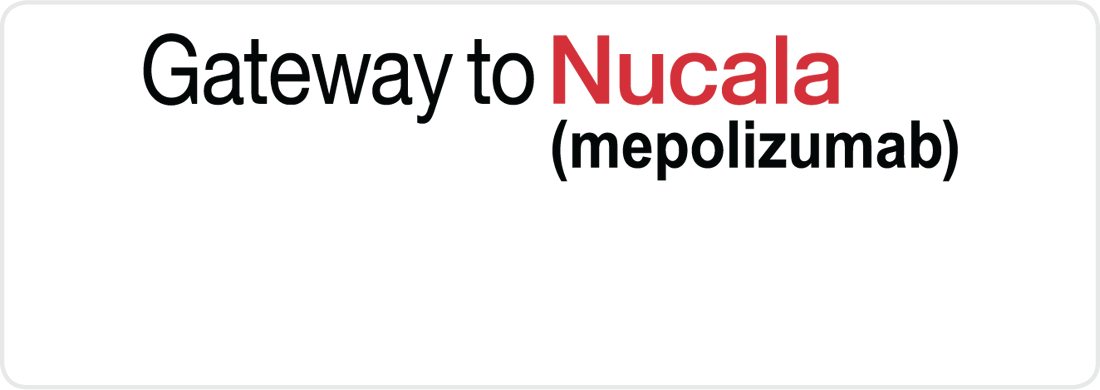NARRATOR:
NUCALA is a prescription medicine used with other medicines for the treatment of adults with eosinophilic granulomatosis with polyangiitis (EGPA). Do not use NUCALA if you are allergic to mepolizumab or any of the ingredients in NUCALA. Remember to watch the full video for additional safety information.
ON-SCREEN TEXT:
NUCALA is a prescription medicine used with other medicines for the treatment of adults with eosinophilic granulomatosis with polyangiitis (EGPA). IMPORTANT SAFETY INFORMATION. Do not use NUCALA if you are allergic to mepolizumab or any of the ingredients in NUCALA. Please see full Prescribing Information, including Patient Information, at NUCALA.com/EGPA.
ON-SCREEN TEXT:
Kate’s Story
ON-SCREEN TEXT:
Kate is a real patient who is taking NUCALA. GSK paid for her time and expenses in sharing her unique experiences.
KATE:
My name is Kate. I live in western Massachusetts with my partner, Adam.
ON-SCREEN TEXT:
Everyone’s experience with EGPA is different. If you think you might have EGPA, be sure to talk to your doctor about your symptoms. EGPA was formerly known as Churg-Strauss syndrome.
KATE:
I've lived with EGPA for most of my life. I was playing a soccer game when I was 6 and collapsed on the field. I started uh... hyperventilating and they ended up calling an ambulance. They said that I had severe asthma.
ON-SCREEN TEXT:
Kate
Living with EGPA and Taking NUCALA
KATE:
I saw 14 different doctors between the ages of 6 and 16 that all had their own opinion or had an idea of how I should be treated. In addition to the asthma attacks, I was having frequent sinus and ear infections.
KATE:
When I was 16 uhm… I started having really bad lung pain where I couldn't lay down, sit up. I cried all the time. And I tried not to complain, but my parents knew something was really wrong. So they brought me to a local hospital.
ON-SCREEN TEXT:
NUCALA is approved for adults with EGPA aged 18 and older.
KATE:
I was told I had multiple lesions on my lung and that I would need surgery. And I went in, and they were almost 100 percent sure it was cancer. And then I got out and was like, "This is great. I don't have cancer." You know, my family was smiling, everyone was relieved, and then they told me that I had EGPA.
ON-SCREEN TEXT:
This is Kate’s experience. Everyone’s experience is different.
KATE:
At the time I was diagnosed there were no FDA-approved treatments to treat EGPA. My doctors proposed using various medications to try and control the symptoms. From the corticosteroid that the doctors had put me on I gained a ton of weight. These medications kept me alive, but my doctors were concerned about the impact of using them long-term. A lot of people told me not to go to college. It was a waste of time. I just figured, one, what was there to lose and, two, if I'm not here to do something then why am I still here? There's a reason, so you have to keep going. So I went to college. I graduated on time even though I missed a whole semester for a second lung surgery.
ON-SCREEN TEXT:
Be sure to talk to your doctor about all of your symptoms, regardless of whether or not you think they are EGPA-related.
KATE:
In 2012 they found uh... peripheral neuropathy in my hands and feet, which is a type of permanent nerve damage, and so my feet are like really tingly or burn all the time. I can't wear like high heels or things like that, real tight shoes. Then uh... my hands I lost complete feeling in. I started burning myself from holding pans. I felt like my body was failing me. I heard about this clinical trial and the doctor was really excited to let me try it if I was open to that, so we decided to go for it. About three months into the trial I remember turning to Adam and just saying "I think I'm getting the medication." I didn't have my breathing machine with me everywhere. I just felt more myself for the first time in as long as I could remember, to be honest.
ON-SCREEN TEXT:
This is Kate’s experience. Everyone’s experience is different.
KATE:
And then December 2017, they posted FDA approval, and I'm pretty sure I cried that day thinking there are going to be patients that are diagnosed that can go on a medication that's FDA approved. Knowing that other patients have the opportunity to be on NUCALA was the most empowering thing I could think of. Since being on NUCALA, I've had less flare-ups or relapses. I worked with my doctors to slowly and gradually go down on the steroids.
ON-SCREEN TEXT:
Talk to your doctor before stopping any of your medication.
KATE:
The day that I found out I was in remission it wasn't something we'd-- I'd expected to hear, and so when I got home and Adam and I had talked about it, he had ordered a ring that night. I didn't know, and uh... we got it two weeks later and officially got engaged. I never thought I'd feel well enough to accept a proposal. In certain ways, I get to have a pretty normal life. I have amazing friends who have done above and beyond. They're more like family.
ON-SCREEN TEXT:
The people in this scene are Kate’s closest friends.
KATE:
Of course this has been my experience, and yours could be different. Education of diseases like these is so important. The more people learn about it, the more we get out there, the more doctors can study it, it means that hopefully patients can get diagnosed quicker, better treatment, better prognosis. I hope that I can make people understand that with a diagnosis like this it's devastating at first, but there is a way past it, and there is a way to keep going, and you don't have to necessarily do it alone, and hopefully you don't.
ON-SCREEN TEXT:
Talk with your doctor to see if NUCALA may be right for you.
ON-SCREEN TEXT:
Nucala (mepolizumab) Injection 100 mg/mL
NARRATOR:
NUCALA is a prescription medicine used with other medicines for the treatment of adults with eosinophilic granulomatosis with polyangiitis (EGPA).
Do not use NUCALA if you are allergic to mepolizumab or any of the ingredients in NUCALA.
NUCALA can cause serious side effects, including allergic (hypersensitivity) reactions, including anaphylaxis. Serious allergic reactions can happen after you get your injection of NUCALA. Allergic reactions can sometimes happen hours or days after you get a dose of NUCALA.
Tell your healthcare provider or get emergency help right away if you have any of the following symptoms of an allergic reaction: swelling of your face, mouth, and tongue, breathing problems, fainting, dizziness, feeling light-headed (low blood pressure), rash, hives. Herpes zoster infections that can cause shingles have happened in people who received NUCALA. Before receiving NUCALA, tell your healthcare provider about all of your medical conditions, including if you are taking oral or inhaled corticosteroid medicines. Do not stop taking your other medicines, including your corticosteroid medicines, unless instructed by your healthcare provider because this may cause other symptoms to come back. Have a parasitic (helminth) infection. Are pregnant or plan to become pregnant. It is not known if NUCALA may harm your unborn baby. Are breastfeeding or plan to breastfeed. You and your healthcare provider should decide if you will use NUCALA and breastfeed. You should not do both without talking with your healthcare provider first. Are taking prescription and over-the-counter medicines, vitamins, and herbal supplements.
The most common side effects of NUCALA include: headache, injection site reactions (pain, redness, swelling, itching, or a burning feeling at the injection site), back pain, and weakness (fatigue).
You are encouraged to report negative side effects of prescription drugs to the FDA. Visit www.fda.gov/medwatch, or call 1-800-FDA-1088.
ON-SCREEN TEXT:
APPROVED USE. NUCALA is a prescription medicine used with other medicines for the treatment of adults with eosinophilic granulomatosis with polyangiitis (EGPA).
IMPORTANT SAFETY INFORMATION. Do not use NUCALA if you are allergic to mepolizumab or any of the ingredients in NUCALA.
NUCALA can cause serious side effects, including allergic (hypersensitivity) reactions, including anaphylaxis. Serious allergic reactions can happen after you get your injection of NUCALA. Allergic reactions can sometimes happen hours or days after you get a dose of NUCALA.
Tell your healthcare provider or get emergency help right away if you have any of the following symptoms of an allergic reaction: swelling of your face, mouth, and tongue, breathing problems, fainting, dizziness, feeling light-headed (low blood pressure), rash, hives. Herpes zoster infections that can cause shingles have happened in people who received NUCALA. Before receiving NUCALA, tell your healthcare provider about all of your medical conditions, including if you are taking oral or inhaled corticosteroid medicines. Do not stop taking your other medicines, including your corticosteroid medicines, unless instructed by your healthcare provider because this may cause other symptoms to come back. Have a parasitic (helminth) infection. Are pregnant or plan to become pregnant. It is not known if NUCALA may harm your unborn baby. Are breastfeeding or plan to breastfeed. You and your healthcare provider should decide if you will use NUCALA and breastfeed. You should not do both without talking with your healthcare provider first. Are taking prescription and over-the-counter medicines, vitamins, and herbal supplements.
The most common side effects of NUCALA include: headache, injection site reactions (pain, redness, swelling, itching, or a burning feeling at the injection site), back pain, and weakness (fatigue).
You are encouraged to report negative side effects of prescription drugs to the FDA. Visit www.fda.gov/medwatch, or call 1-800-FDA-1088.
Nucala (mepolizumab) Injection 100 mg/mL
Trademarks are owned by or licensed to the GSK group of companies. ©2022 GSK or licensor. MPLVID190036 September 2022 Produced in USA.


